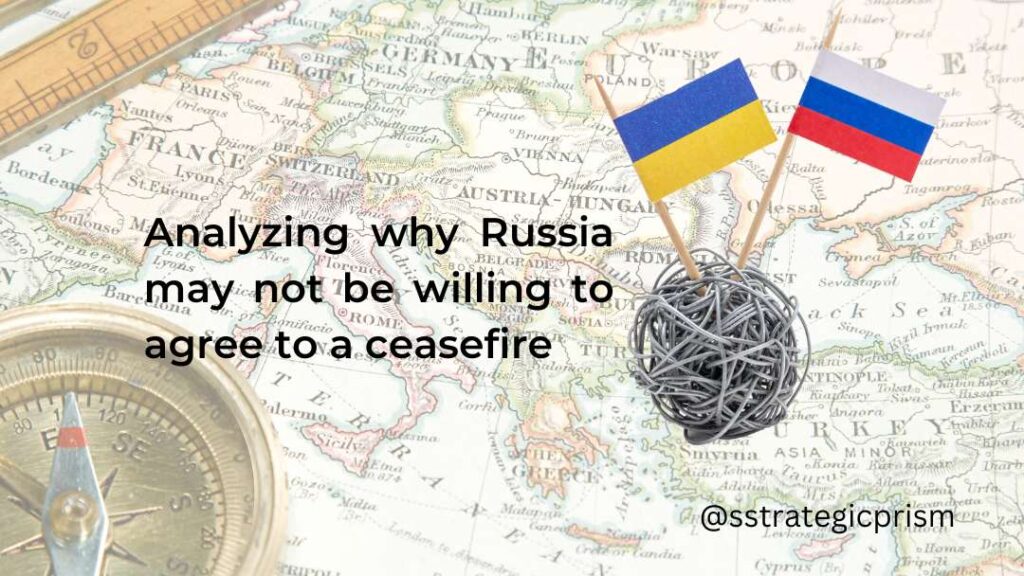
The ongoing Russia-Ukraine conflict, now in its third year, remains a highly complex and evolving geopolitical crisis. As of early 2025, Russian forces have made notable territorial gains in eastern Ukraine, while the United States and its allies have continued providing military aid to Kyiv. Against this backdrop, discussions of a potential ceasefire have resurfaced, with the U.S. proposing a temporary halt to hostilities. However, given past experiences and strategic considerations, Russia appears unlikely to agree to such a ceasefire under the current conditions.
Moscow’s reluctance to engage in negotiations stems from several factors, including previous failed agreements such as the Minsk Accords, the abandoned 2022 Istanbul negotiations, and ongoing Western military support for Ukraine. This article provides an overview of the current situation, explores why Russia may not be willing to agree to a ceasefire, and outlines the key risks and considerations influencing Moscow’s decision-making.
Current State of the Russia-Ukraine Conflict
As of March 2025, the battlefield dynamics have shifted in favor of Russia, which has secured strategic victories in eastern Ukraine. Notable developments include:
- The capture of key towns such as Avdiivka, Vuhledar, and parts of Donetsk, consolidating Russian control over contested regions.
- Sustained Russian missile and drone attacks on Ukraine’s energy infrastructure, creating further instability in the country.
- Ukraine’s ongoing counteroffensive efforts, which, despite Western support, have struggled to achieve significant breakthroughs.
- The continued supply of Western military aid, including U.S. and NATO-provided weapons, financial assistance, and intelligence-sharing.
- Reports of Ukraine launching limited cross-border attacks into Russia, including in the Kursk region, raising the stakes in the conflict.
With these developments in mind, any ceasefire agreement would have to be carefully evaluated by Russia to determine whether it aligns with its strategic objectives.
Why Russia is Reluctant to Accept a Ceasefire
- The Minsk Accords and Perceived Western Deception
One of the major reasons for Russia’s reluctance to agree to a ceasefire is its experience with the Minsk Agreements. Minsk I (2014) and Minsk II (2015) were intended to provide a framework for ending hostilities in Donbas by granting autonomy to the breakaway regions while keeping them under Ukrainian sovereignty. However, in later years, Western and Ukrainian officials admitted that these agreements primarily served to buy time for Ukraine to strengthen its military capabilities.
Notably, former German Chancellor Angela Merkel and ex-French President François Hollande acknowledged that the Minsk Accords were never intended to be a lasting solution but rather a strategic delay to allow Ukraine to prepare for a future confrontation with Russia. From Moscow’s perspective, this revelation solidified its distrust in Western-backed negotiations. If Russia believes that any ceasefire today would simply give Ukraine another opportunity to rearm and reorganize for a future offensive, it has little incentive to agree to one.
- The 2022 Istanbul Negotiations and Ukraine’s Withdrawal
Following Russia’s invasion in February 2022, peace talks were held in Istanbul, Turkey. These negotiations initially seemed promising, with Ukraine reportedly agreeing to discuss neutrality in exchange for security guarantees. Russia, in what it saw as a good-faith gesture, withdrew its forces from around Kyiv to demonstrate its willingness to negotiate.
However, shortly after Russian forces left the region, Ukraine abandoned the peace talks and refocused on military resistance. Encouraged by increasing Western military assistance, Kyiv chose to continue fighting rather than accept a settlement that might have required territorial concessions. This decision reinforced Russia’s belief that Ukraine and its allies were not interested in diplomacy but rather in prolonging the conflict to weaken Russia.
Given this history, Moscow is likely to view any new ceasefire negotiations as a potential trap—an opportunity for Ukraine and NATO to strengthen their positions before resuming hostilities at a later date.
- U.S. Military Aid and Strategic Concerns
Another critical factor influencing Russia’s stance is the resumption of large-scale U.S. military aid to Ukraine. Recent U.S. assistance packages include advanced weaponry, ammunition, and financial support for Kyiv’s war effort. If Ukraine is receiving continued Western aid, a ceasefire would only serve to allow it time to:
- Replenish depleted military stockpiles.
- Train additional forces with Western support.
- Improve its defense infrastructure.
- Plan and launch future counteroffensives against Russian-held territories.
From Russia’s perspective, a ceasefire that does not include concrete guarantees of halting Western arms shipments is not in its strategic interest. Instead of freezing the conflict in an unfavorable position, Russia may prefer to continue its offensive while Ukraine remains vulnerable.
- Russia’s Current Military Momentum
Unlike in the early months of the war, when Ukrainian forces successfully pushed back Russian advances, the current battlefield situation is more favorable to Russia. With control over key parts of eastern Ukraine and an offensive that continues to gain ground, Russia may view a ceasefire as an unnecessary concession.
If Moscow halts military operations now, it risks solidifying Ukraine’s defenses while failing to achieve the strategic goals that motivated its intervention in the first place—namely, ensuring Ukraine does not become a NATO-aligned state and securing control over disputed territories.
- Western Involvement and Distrust of Negotiations
Russia perceives the Ukraine war as a broader conflict against NATO rather than just a bilateral war with Ukraine. With Western intelligence agencies actively assisting Ukraine and NATO countries supplying advanced weapons, Russia sees any negotiations as being influenced by Washington, London, and Brussels rather than Kyiv alone.
Given the West’s historical reluctance to pressure Ukraine into making territorial concessions, Moscow has little reason to trust that future negotiations would yield a favorable outcome. Instead, Russia is likely to continue leveraging military pressure as its primary tool for achieving strategic objectives.
Under What Conditions Might Russia Consider a Ceasefire?
While Russia is unlikely to agree to a ceasefire under current conditions, certain factors could push it toward negotiations in the future:
- Domestic Economic and Political Considerations: Prolonged conflict is expensive, and while Russia has adapted to sanctions, continued warfare could strain its economy and political stability.
- Ironclad Guarantees on Ukraine’s Neutrality: If NATO and the U.S. were to provide legally binding assurances that Ukraine would not join the alliance, Russia might be more willing to consider a ceasefire.
- A Military Stalemate: If Russia fails to achieve further significant territorial gains and faces increased resistance from Ukrainian forces, it may view negotiations as a pragmatic option.
- A Shift in Western Policy: If Western nations become more divided on supporting Ukraine, resulting in reduced military aid, Moscow may see an opportunity to push for a favorable settlement.
Conclusion
Russia’s reluctance to agree to a ceasefire in Ukraine is rooted in strategic, historical, and geopolitical considerations. Previous ceasefire agreements, such as the Minsk Accords and the 2022 Istanbul negotiations, have led Moscow to distrust Western and Ukrainian commitments. Additionally, with continued U.S. military aid to Ukraine and Russia’s own battlefield momentum, the Kremlin sees little incentive to halt its offensive operations.
For a ceasefire to be viable, Russia would require strong security guarantees, an end to Western military support for Ukraine, and assurances that negotiations would not simply serve as another delay tactic. Until such conditions are met, Russia is likely to continue pursuing its military objectives, viewing diplomacy as a secondary tool rather than a path to resolution.

Paramjeet Singh is a researcher and analyst in the field of National Security and Strategic Affairs. His interest in the domain led him to pursue a Master’s degree in Defence and Strategic Studies from Punjab University, where he was a Gold Medalist. Currently, he is pursuing his Ph.D. in the Department of Defence & National Security Studies at Panjab University. Singh has contributed research and analysis on various issues related to national security, strategic influence, and international relations. His research work includes a dissertation on “Cyber Security & Cyber Warfare: Implications on India’s National Security” and research papers on topics such as the Baloch Nationalist Movement, India’s trade relations with adversaries, and disaster vulnerabilities. Topic of his Ph.D. is Cognitive Warfare
Very logical analysis leading to plausible inferences. The only posers are – how does it play out against Trump template ? Does Russia have the stamina to continue or will it like to interim solution of autonomy to Donetsk, Luhansk, Kherson & Zaphrozhazhia?
Time will only tell. After 3 years of conflict, Russia is still not showing any major signs of fatigue. Trump has just come to office, it will be some time before he gets the real idea of the situations. It’s highly unlikely, Russia will relinquish the areas already captured. We will have to wait to see which direction everything goes.